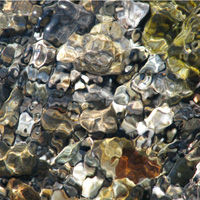Lumen Naturae: The Light of Nature
 This website is about the light of nature, an intuitive idea, found in thinkers of the Middle Ages and in many natural cultures, that there is a certain wisdom (light=consciousness) in nature.
This website is about the light of nature, an intuitive idea, found in thinkers of the Middle Ages and in many natural cultures, that there is a certain wisdom (light=consciousness) in nature.
What could this intuition be referring to? Perhaps it is the idea that we are also a part of nature (atoms, molecules, genes, neural networks), or that we can learn lessons from nature. You might say: “Nature is not wise, that is a projection! We human beings are conscious, we have memory; nature is unconscious, she is just nature, she cannot be wise!”
On the other hand, people do say: “I have to listen to my heart” or “I answered from my gut” or “Listen to what the trees and stones tell us.” Even the Bible (Job 12:8) has: “Speak to the Earth, and it will teach you.” Certainly guts do not talk[1] and trees and stones for that matter neither. Then what are we really talking about?
Looking closer (which I do in the pages linked on the right), I discovered that this light is a symbol for our conscious knowledge, or inspiration that comes out of the unconscious, which often appears to come directly from nature. Projected, yes. But still, is there or is there no “intelligence” in nature?. The answer given here is “Yes, but only when we make this conscious.” That is, nature unfolds her “intelligence” in connection with our intelligence.
Being a natural scientist by my nature and also by years of study and research (at the Federal Polytechnic [ETH] in Zürich, on quantum physics, plate tectonics and non-linear natural processes), I decided to delve a bit deeper into these issues. In doing this, I came across the writings of a wild European character, Theophrastus Paracelsus, who lived in the 16th century. He expressed with eloquence, depth, and fervor (and a bit of craziness) his answers to questions about man’s relationship to himself, nature, and God. Unlike myself, he seemed to have found a way to unify his own divergent voices. Thus I decided to investigate my own fascination and split by trying to understand what Paracelsus meant by “knowledge from God” and “knowledge from nature”. I single out Paracelsus over many other writers, thinkers, and visionaries because he seems to have been aware of the god-like power that technology could wield and yet he expressed a differentiated attitude about the ethical responsibility involved in man’s use of the light of nature. This differentiated attitude is, to my mind, not always shared by modern scientists. My particular personal problem is that I have neither a standpoint of my own nor much spiritual insight. The point of this essay is to help me to develop some kind of standpoint and, hopefully, a ray of light along the dark path to more spiritual attitude.
[1] I am not so sure on this; consider the statement: “Gut feelings are not just free-floating emotional states but actual physical sensations that convey meaning to certain areas in the brain.” Louann Brizendine, The Female Brain, Broadway Random House, 2006, p. 120. See also Michael D. Gershon, The Second Brain, The Scientific Basis of Gut Instinct and a Groundbreaking New Understanding of Nervous Disorders of the Stomach and Intestine, 1998, HarperCollins Publishers, Inc., New York.